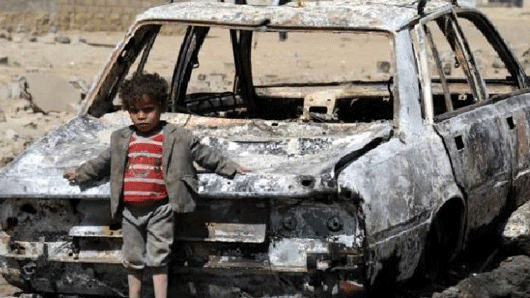
Local Editor
The United Nations caved in to intense pressure from Saudi Arabia, including the threat of a fatwa, and removed the kingdom from a list of countries accused of serious crimes against children, diplomatic sources have revealed.
Riyadh is said to have threatened to cut millions of dollars for UN aid programs after it was condemned for its bombing campaign in Yemen.
A UN report accused the Saudi-led coalition of killing 60 per cent of the 785 children who perished in the war last year. It censured the kingdom, alongside Somalia and the Central African Republic, in a report backed by Ban Ki Moon, the UN secretary-general.
The report, published last week, provoked an angry response, with Saudi officials demanding that it be "corrected".
In an unprecedented move the UN removed the kingdom from the list of countries accused of crimes against children, pending a joint review by UN officials and Saudi authorities.
Sources said that the decision to revise the report followed a campaign of "bullying, threats, and pressure" from Saudi Arabia and Gulf allies who feared it could have far-reaching diplomatic ramifications and prevent arms deals.
Diplomats said that the Saudis had warned that clerics in Riyadh were poised to issue a fatwa, or religious edict, against the UN, declaring it anti-Muslim. This would have effectively mounted a boycott of the UN by the 56 member states of the Organization of Islamic Cooperation (OIC). The Saudis also said that the report put millions of dollars of funding to UN programs in the region under threat.
That would have meant "no contacts of OIC members, no relations, contributions, support, to any UN projects, programs," a diplomat source said.
The secretary-general’s office was bombarded by calls from Saudi officials, Gulf state foreign minsters and ministers from the OIC in what one UN official described as a "full-court press", a man-on-man defence in basketball. Representatives from Jordan, the United Arab Emirates, Bangladesh, Bahrain, Egypt, Kuwait and Qatar were among those who called the UN chief.
The report stated that Saudi-led air strikes were responsible for nearly half of the 101 documented attacks on schools and hospitals. The Yemen war has caused the world’s largest humanitarian crisis, according to the UN, with more than 2.5 million people displaced.
Rights groups had hoped that Saudi’s listing would force governments to rethink weapons deals. They called the UN’s action "unprecedented", saying that it had done irreversible damage to the world body. "It’s the first time ever, in our knowledge, that a country on the list has been removed after publishing," said Rasha Mohamed, Yemen researcher at Amnesty International.
Human Rights Watch called the UN revision of the report a "new low".
Abdullah Al-Mouallimi, Saudi ambassador to the UN, vehemently denied the claims, saying that Riyadh doesn’t "use threats or intimidation" and was "very committed to the United Nations."
Stephane Dujarric, Ban’s spokesman, defended the move saying: "The world turns. The situation evolves. And that was the decision that was taken."
Source: News Agencies, Edited by Website Team